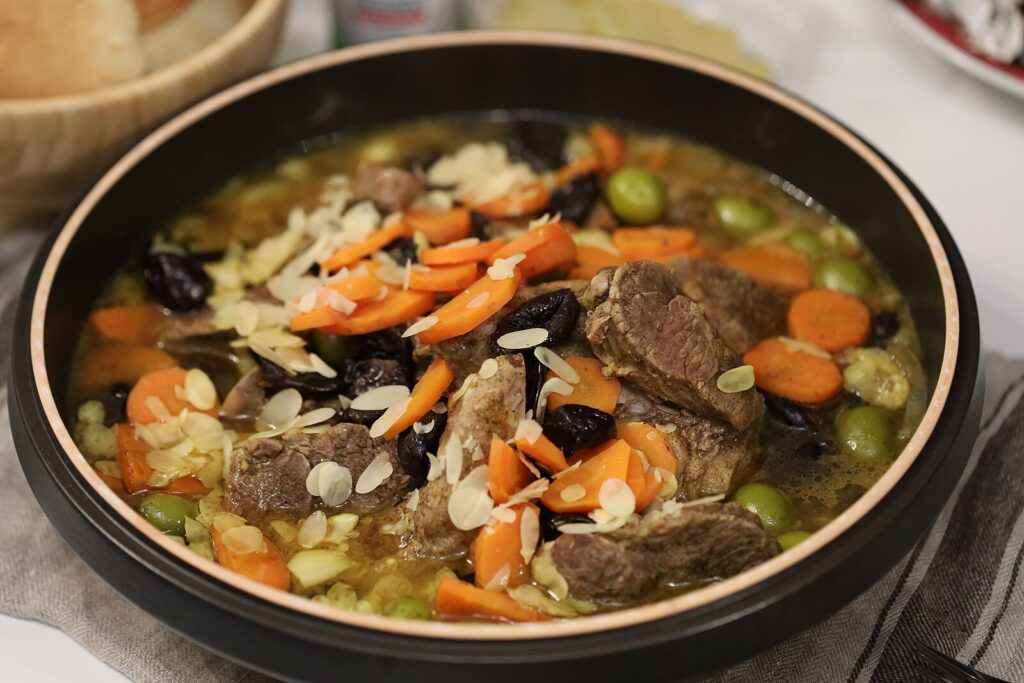Algerian Cuisine: A Fusion of Flavors from Africa, Europe, and the Arab World

By: Rania Elshanawy Basria | Arab America Contributing Writer
Algerian cuisine is a fascinating tapestry weaved from numerous cultural influences from Africa, Europe, and the Middle East. This culinary legacy represents Algeria’s past as a cultural crossroads, where Berber traditions coexist with Arab, French, Ottoman, and Mediterranean influences. Written by Arab America Contributing Writer Rania Elshanawy Basria states, the end product is a vivid and one-of-a-kind culinary experience that tantalizes the senses while also telling a tale of cultural fusion.
Algerian cuisine is founded on the old Berber culture, which has affected the country’s eating customs for generations. Berber recipes, known for their simplicity and reliance on local ingredients, are still popular today.
The Arab influence, which dates back to the seventh century, introduced a range of spices, cereals, and culinary methods. Cumin, coriander, cinnamon, and saffron are common spices used in Algerian cuisine. Arab traders also introduced dates and other dried fruits, which are currently used in a variety of sweet and savory cuisines.
The Ottoman Empire’s dominance over Algeria from the 16th to 19th centuries had a long-lasting effect on the cuisine, notably in the form of pastries and sweets. Baklava, a rich pastry consisting of layers of filo dough, almonds, and honey, is a famous dessert that demonstrates this influence. Additionally, delicacies such as chorba (a spicy soup) and mhadjeb (a filled flatbread) have strong Turkish heritage.
The French colonial period imported European cooking skills and ingredients, which were combined with native Algerian traditions to form new culinary fusions. French baguettes, pastries, and meals such as gratins and quiches have been modified to integrate local flavors and ingredients, resulting in distinct Algerian variants.
Algerian cuisine emphasizes fresh vegetables, beans, meats, and seafood, reflecting the country’s diverse terrain and climate. Key components include tomatoes, peppers, onions, garlic, chickpeas, and a variety of spices. Olive oil is a key ingredient, used liberally in both cooking and dressing foods.
Another famous meal is tagine, a slow-cooked stew called after the clay pot in which it is prepared. While tagine originated in Morocco, Algerian variations can be cooked with lamb, chicken, or fish and are seasoned with a combination of spices, dried fruits and nuts. The end result is a richly fragrant and tasty meal that is both soothing and sophisticated.
Mechoui, a classic meal of entire roasted lamb, is frequently served for special events and celebrations. The lamb is marinated with spices and herbs before being slow-roasted to perfection, producing soft, tasty meat that is typically served with bread and salads.
Mint tea, a traditional beverage, is a sign of hospitality and is commonly provided to guests. Coffee, which has been inspired by French culture, is also commonly drunk, frequently served strong and savored throughout the day.
Algerian cuisine is a remarkable combination of tastes that reflects the country’s long history and cultural diversity. From the hearty and communal aspect of couscous, despite its shared heritage with Morocco, to the varied and sweet joys of baklava, Algerian cuisine takes you on a gastronomic trip through time and countries. This rich gourmet legacy is still evolving, honoring the African, European, and Middle Eastern elements that make it genuinely distinct.
Check out our Blog here!







